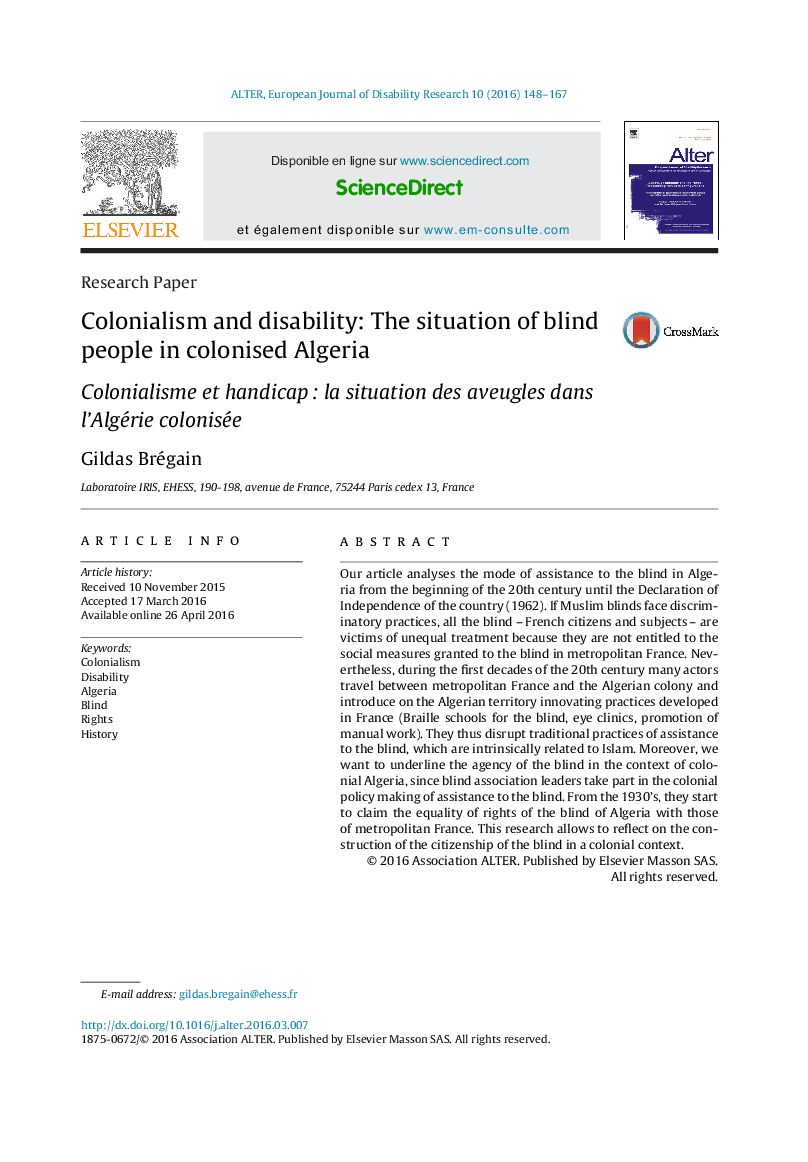| کد مقاله | کد نشریه | سال انتشار | مقاله انگلیسی | نسخه تمام متن |
|---|---|---|---|---|
| 1068052 | 949084 | 2016 | 20 صفحه PDF | دانلود رایگان |
Our article analyses the mode of assistance to the blind in Algeria from the beginning of the 20th century until the Declaration of Independence of the country (1962). If Muslim blinds face discriminatory practices, all the blind – French citizens and subjects – are victims of unequal treatment because they are not entitled to the social measures granted to the blind in metropolitan France. Nevertheless, during the first decades of the 20th century many actors travel between metropolitan France and the Algerian colony and introduce on the Algerian territory innovating practices developed in France (Braille schools for the blind, eye clinics, promotion of manual work). They thus disrupt traditional practices of assistance to the blind, which are intrinsically related to Islam. Moreover, we want to underline the agency of the blind in the context of colonial Algeria, since blind association leaders take part in the colonial policy making of assistance to the blind. From the 1930's, they start to claim the equality of rights of the blind of Algeria with those of metropolitan France. This research allows to reflect on the construction of the citizenship of the blind in a colonial context.
RésuméNotre article analyse le régime de prise en charge des aveugles en Algérie, du début du XXe siècle jusqu’à la déclaration d’indépendance du pays (1962). Si les aveugles musulmans sont l’objet de pratiques discriminatoires, tous les aveugles – citoyens et sujets français – sont victimes d’un traitement inégalitaire car ils ne bénéficient pas des mesures de protection sociale accordées aux aveugles de la métropole. Néanmoins, de nombreux acteurs circulent entre la métropole et la colonie algérienne dès les premières décennies du XXe siècle, et insèrent sur le territoire algérien des pratiques innovantes développées dans la métropole (écoles spécialisées d’enseignement du Braille, dispensaire ophtalmologique, promotion des activités professionnelles manuelles). Ils bouleversent ainsi des pratiques traditionnelles d’assistance aux aveugles, dont certaines sont intrinsèquement liées à l’Islam. De plus, nous tenons à souligner la capacité d’action autonome des aveugles dans le contexte de l’Algérie colonisée, puisque les dirigeants associatifs aveugles participent largement à la construction de la politique coloniale d’assistance aux aveugles. Dès les années 1930, des revendications émergent en faveur de l’égalité des droits des aveugles d’Algérie avec ceux de la métropole française. Cette recherche permet de réfléchir à la construction de la citoyenneté des aveugles dans un contexte colonial.
Journal: ALTER - European Journal of Disability Research / Revue Européenne de Recherche sur le Handicap - Volume 10, Issue 2, April–June 2016, Pages 148–167
